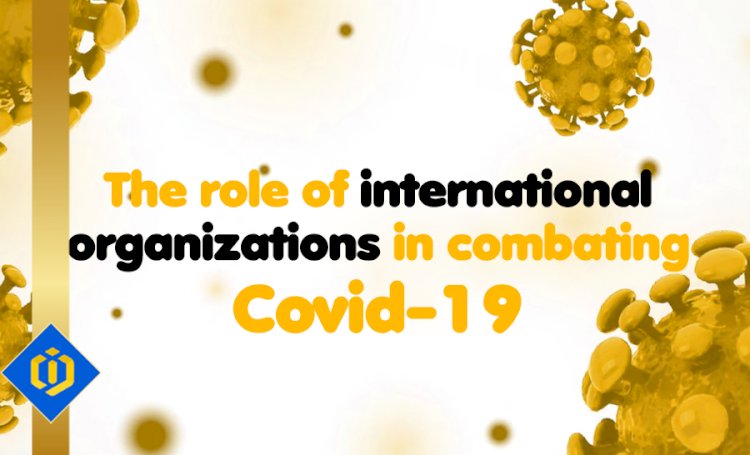What Actions Have Been Taken by International Organizations to Tackle Covid-19?

International organizations (IOs) are essential to the fight against the COVID-19 pandemic and to providing aid to all affected nations. The sharing of resources, knowledge, and best practices to address health, economic, and social challenges is made possible by IOs, which offer an institutional framework for international cooperation and coordination.
The World Health Organization (WHO), which coordinates surveillance, containment, and treatment efforts, mobilizes resources and partners, conducts research and development, and supports vaccine access, has been at the forefront of the international health response to COVID-19. By promoting vaccine sharing and backing the COVAX initiative to provide vaccines to low- and middle-income countries, the WHO has also worked to ensure that everyone has access to vaccines.
In order to assist nations in responding to the immediate health effects of COVID-19 and to promote their economic recovery, the World Bank Group (WBG) has pledged $157 billion. The WBG has increased social protection measures, bolstered health systems, facilitated trade, and allotted debt relief to eligible nations. In order to increase access to healthcare and education services as well as economic opportunities, the WBG has also supported the development of digital infrastructure and technologies.
85 nations have received emergency financing from the International Monetary Fund (IMF) totaling more than $117 billion to help them deal with the COVID-19's economic effects. The IMF has also improved its lending capacity, expanded its capacity to provide policy advice, supported vaccine access, and pushed for greater international cooperation. It has also provided 29 low-income countries with debt service relief.
However, IOs have had trouble converting their governance structures, normative frameworks, and decision-making procedures to a virtual setting. The pandemic has brought attention to the need for IOs to be more adaptable and nimble in the face of rapidly shifting conditions while upholding transparency, accountability, and stakeholder engagement.
Going forward, IOs will remain essential to helping nations recover from the pandemic. While promoting sustainable and inclusive economic growth, they will need to give investments in social safety nets, health care systems, and educational programs top priority. To ensure a well-coordinated and efficient response to the ongoing global crisis, collaboration and cooperation between IOs as well as with national governments, civil society organizations, and the private sector will be crucial.
The evaluation of international organizations' performance in combating the COVID-19 pandemic is a difficult and contentious topic. Since various stakeholders may have various expectations, perspectives, and interests regarding what constitutes effective action by international organizations, it is impossible to establish a clear or universal standard for evaluating how well they have carried out their roles and functions during the pandemic.
To evaluate their efficacy, however, there are a few potential markers or standards. These factors include the promptness, sufficiency, and caliber of their responses to the health, economic, and social challenges posed by COVID-19, the degree to which they have coordinated and collaborated with one another and with other actors such as national governments, civil society, and the private sector, the impact and results of their interventions on reducing the spread and severity of COVID-19 and assisting nations and communities in recovering, and the legitimacy, accountability, and transparency of their actions.
Some international organizations might have outperformed others based on these metrics or indicators in particular areas or subfields. In delivering their services or offering their support, some organizations may have been more proactive, inventive, or adaptable, whereas others may have encountered more limitations, difficulties, or criticism as a result of their mandates, structures, or politics.
People have criticized the World Health Organization (WHO) for its initial response to the pandemic, which they felt was slow and insufficient. The WHO has been commended for its work coordinating a global response, offering technical support and guidance, and fighting for vaccine equity and accessibility.
Similar criticism has been leveled at the World Bank Group (WBG) and the International Monetary Fund (IMF) for the conditionality and policies surrounding debt relief, which some have argued may impede countries' long-term development and resilience. However, in addition to advocating for more funding for health and social protection systems, both organizations have also given vital financial and technical support to nations in need.
In the end, a variety of factors, including international organizations' resources, capacities, leadership styles, collaborations, and governance structures, will determine how well they are able to address COVID-19. In order to ensure a coordinated and inclusive response, it also depends on how they adjust to the shifting demands and realities of the pandemic situation.
During the COVID-19 pandemic, international organizations identified best practices and lessons that can be applied to future responses to public health emergencies. In the European Region, for instance, member states and partners have identified ten key lessons that have been learned, according to the World Health Organization (WHO). These include enhancing data and digital health systems, addressing social and economic determinants of health, protecting mental health and well-being, fostering innovation and research, and advancing health diplomacy. They also include strengthening public health capacities and services, investing in preparedness and resilience, ensuring equitable access to healthcare and vaccines, engaging and empowering communities, encouraging solidarity and cooperation, and.
The United Nations Children's Fund (UNICEF) has also documented country-specific case studies of immunization efforts during COVID-19, demonstrating how various nations have overcome obstacles like vaccine hesitancy, false information, supply chain disruptions, infection prevention and control requirements, and social distancing requirements. The report also emphasizes the significance of government initiative, multi-agency participation, community acceptance, context-appropriate adaptation, safety standards, and assistance for vulnerable populations. The challenges and flaws that need to be fixed or addressed have also been faced by international organizations. For instance, some organizations have received criticism for their initial responses to the pandemic, while others have struggled to coordinate a global response or address disparities in access to vaccines and healthcare.
Overall, COVID-19's best practices and lessons learned by international organizations highlight the significance of promoting solidarity and cooperation, investing in preparedness and resilience, interacting with communities and stakeholders, and utilizing digital technologies and innovation to improve health systems and services. International organizations can assist nations and communities in responding to global health challenges and advancing sustainable and inclusive development by taking lessons from these experiences.
In conclusion, IOs are critical to combating the COVID-19 pandemic and assisting affected nations all over the world. To minimize the pandemic's effects on health and the economy, their efforts in providing technical guidance, mobilizing resources, and promoting vaccine access are essential. To support a long-lasting and inclusive recovery, IOs will need to adjust to changing conditions, prioritize investments in important sectors, and increase collaboration and cooperation.
Author: Pooyan Ghamari, Swiss Economist and Visionary in Global Markets and Finances

 content-team
content-team 


















